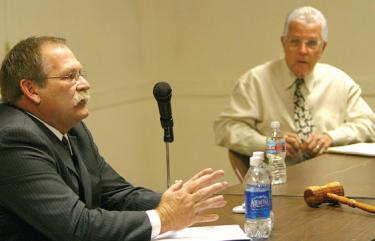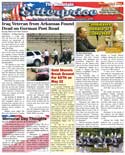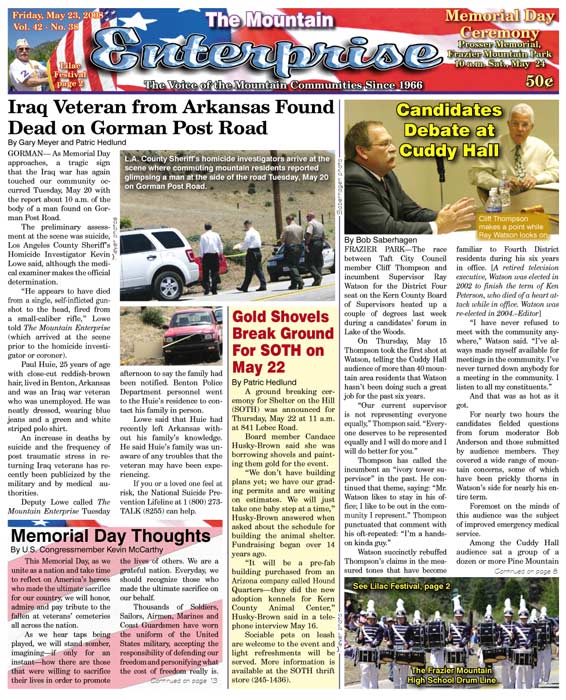
Cliff Thompson makes a point while Ray Watson looks on.
By Bob Saberhagen
FRAZIER PARK-The race between Taft City Council member Cliff Thompson and incumbent Supervisor Ray Watson for the District Four seat on the Kern County Board of Supervisors heated up a couple of degrees last week during a candidates’ forum in Lake of the Woods.
On Thursday, May 15 Thompson took the first shot at Watson, telling the Cuddy Hall audience of more than 40 mountain area residents that Watson hasn’t been doing such a great job for the past six years.
"Our current supervisor is not representing everyone equally," Thompson said. "Everyone deserves to be represented equally and I will do more and I will do better for you."
Thompson has called the incumbent an "ivory tower supervisor" in the past. He continued that theme, saying: "Mr. Watson likes to stay in his office; I like to be out in the community I represent." Thompson punctuated that comment with his oft-repeated: "I’m a hands-on kinda guy."
Watson succinctly rebuffed Thompson’s claims in the measured tones that have become familiar to Fourth District residents during his six years in office. [A retired television executive, Watson was elected in 2002 to finish the term of Ken Peterson, who died of a heart attack while in office. Watson was re-elected in 2004.—Editor]
"I have never refused to meet with the community anywhere," Watson said. "I’ve always made myself available for meetings in the community. I’ve never turned down anybody for a meeting in the community. I listen to all my constituents."
And that was as hot as it got.
For nearly two hours the candidates fielded questions from forum moderator Bob Anderson and those submitted by audience members. They covered a wide range of mountain concerns, some of which have been prickly thorns in Watson’s side for nearly his entire term.
Foremost on the minds of this audience was the subject of improved emergency medical service.
Among the Cuddy Hall audience sat a group of a dozen or more Pine Mountain residents who—for the past several years—have been seeking expanded emergency medical services for the remote village at the base of Mt. Pinos and the rest of the Mountain Communities.
Wearing T-shirts with Cliff Thompson campaign logos and speaking as unabashed Thompson supporters, they wanted to know why Watson does not back their effort to have a firefighter paramedic stationed at Kern County Fire Department’s station 58 in Pine Mountain.
"I can’t look you in the eye and honestly tell you that I’m going to get you paramedic service," Watson said. "The money just isn’t there." Unless residents are willing to pay for it themselves, that is
Instead, Watson said, he will help the community establish a way to pay for the expanded service by self-assessment through its Community Service Area 40 or by helping the community become a Community Service District.
"You’ll receive a questionnaire in the mail shortly, asking if you’re willing to pay around $5.90 per month," Watson said. "You will be able to vote whether you are willing to pay or not."
And there’s the rub.
Some residents aren’t willing to pay any more out of their pockets for emergency services to which they feel entitled through their property taxes.
"Why should we pay for something that should be covered with the taxes we already pay?" Pine Mountain resident Frances Durocher asked.
Presently, paramedic service and ambulance transport here are provided by a private company, Hall Ambulance Service, under an exclusive contract with Kern County.
The nearest paramedic-staffed Hall ambulance is stationed about 15 miles away in Frazier Park where response times to Pine Mountain sometimes exceed the 20 minutes mandated by the county. [Public concerns have been raised when the ambulance did not arrive to help a Pine Mountain resident because of snow, or was late because the Frazier Park unit was off the mountain, serving another emergency, leaving residents without timely emergency Advanced Life Support (ALS) services.—Editor]
Thompson agrees that paramedic service in rural areas is essential and believes it can be provided, at least on a trial basis.
"I’m a huge proponent of bringing firefighter paramedics to the outlying areas," he said. "I’d like to start the one-year pilot paramedic program that’s been proposed by Kern County Fire Department." [Kern County Fire Chief Dennis Thompson (no relation to the candidate) proposed a free year-long pilot program in Pine Mountain, using state funds which had already been secured. The offer was rejected when Watson encouraged the board of supervisors to vote it down on April 1 this year.—Editor]
Thompson agrees that paramedic service in rural areas is essential and believes it can be provided, at least on a trial basis.
"I’m a huge proponent of bringing firefighter paramedics to the outlying areas," he said. "I’d like to start the one-year pilot paramedic program that’s been proposed by Kern County Fire Department." [Kern County Fire Chief Dennis Thompson (no relation to the candidate) proposed a free year-long pilot program in Pine Mountain, using state funds which had already been secured. The offer was rejected when Watson encouraged the board of supervisors to vote it down on April 1 this year.—Editor]
If elected, Thompson said he will work closely with the fire chief to facilitate the pilot program which would fund a paramedic in Pine Mountain and, if successful, in other outlying county areas.
Meanwhile, Pine Mountain’s firefighting crew has now increased to three. Currently, firefighters are trained as Emergency Medical Technicians (EMTs), not paramedics. They can’t offer Advanced Life Support procedures. [Paramedic firefighters in other counties are equipped with ALS expertise, equipment and lifesaving drugs. According to Chief Thompson, the presence of the third firefighter in Pine Mountain cleared the way for one of those positions to be filled by an ALS paramedic. However, that next step in the fire chief’s plan was voted down by the board.—Editor]
The focus of the debate soon shifted to Frazier Park. Residents there drive daily on dusty, heavily rutted private roads and trails. In winter these can become downright treacherous from rains, snow and ice, severely affecting emergency response times.
Watson said he understands residents’ frustration with poor road and trail conditions but insists the county’s hands are legally tied.
"We’ve spent thousands of hours trying to find a way to improve them," Watson said. "But we can’t spend public funds on private property. We can help with engineering services and help the community set up a system whereby the trails can be graded, maintained or even paved, but we can’t pay for it or accept them into the county system."
Watson cited as one possible solution the formation of a homeowners’ association similar to Pine Mountain’s property owners association, which collects dues from homeowners to maintain the infrastructure, including private roads.
"It can be done similarly if people are willing," he said.
Otherwise, the option to form a Community Service District (CSD) remains a possibility. [That too, would entail voters agreeing to create the CSD that could tax each parcel to create a fund for road maintenance. The advantage of a CSD over a CSA (County Service Area) is that the CSD has a locally elected board that decides how funds will be allocated. Though a CSA can also collect funds for a specified mission, the board of supervisors makes the decisions about how funds are spent, guided by the CSA’s mission.—Editor]
Such growth is a concern to many who doubt that water resources can adequately sustain such development. Others don’t want their quiet rural lifestyle changed by such an influx of population.
There are also those, like local landowner and realtor Emilie Wainright, who fear a nogrowth mind-set is disastrous for the Mountain Communities.
"What happens if this becomes a no-growth community?" Wainright asked. "With no growth, we won’t survive. We’re going in the wrong direction."
Watson and Thompson hold essentially similar views on development. Both claim they advocate personal property rights.
"No growth is a sign of stagnation," Watson said. "But whatever growth occurs needs to be quality growth."
Thompson, a self-described conservative Republican, said he advocates controlled growth, but not urban sprawl.
"If you allow urbanization here you will lose your present lifestyle," he warned. "It’s a trade off. If you want growth, I will take that into account. If not, I will take that into account. But all projects should be subject to an EIR (Environmental Impact Report). I’m dead set against that kind of development going on in Kern County. If elected, I will not overlook an EIR."
Thompson made it clear that he had no problem with Tejon Ranch Company’s development plans.
"If Tejon Ranch can pass an EIR they should be allowed to develop their property," he said.
Concerning the availability of local water resources to supply large development, Watson said he has been working with state officials toward a comprehensive water plan.
"I’ve been working with the state on an Integrated Regional Water Plan to include all the outlying areas, which we hope will comprehensively address the issues faced in this area from new development," Watson said
Thompson also said he would "work with state officials to address local water issues."
Both candidates took a few minutes in closing to outline what they bring to the table.
Watson offered a list of what has been done for the Mountain Communities during his term, including the Streetscape "beautification" project to improve downtown Frazier Park and a $275,000 grant to help update its aging water system, $3 million for a Pine Mountain fire station scheduled to begin construction in spring 2009, $6 million for a Frazier Park library scheduled to begin construction in the fall or early spring 2009 and work that he said has "already begun" on the restoration of Cuddy Creek.
Thompson told voters he would use his seven year’s experience on the Taft City Council, his experience as mayor of the City of Taft for two years, his four years on the Local Agency Formation Commission (LAFCO) and his experience as a representative to the Kern Council of Governments (KCOG) to work hard on their behalf as county supervisor, tackling public safety, air quality and issues of an aging county infrastructure.
Both candidates vowed to develop new avenues of economic development, which they said is key to improving the health of the Mountain Communities and other rural areas.
–Additional reporting
by Patric Hedlund
This is part of the May 23, 2008 online edition of The Mountain Enterprise.
Have an opinion on this matter? We'd like to hear from you.


